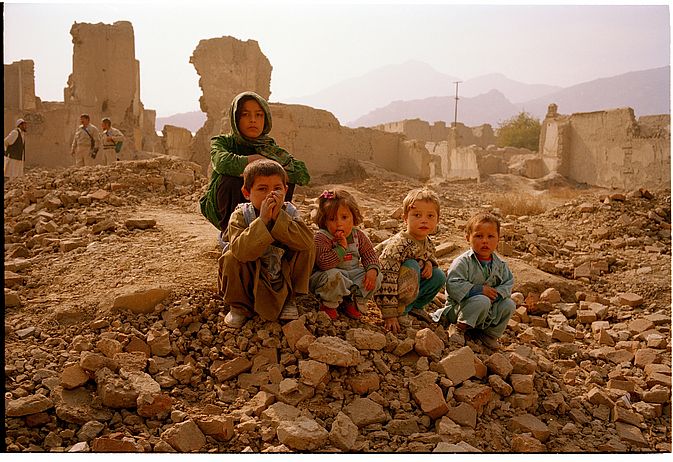Demilitarisation during a war, which cannot be named a "good war". Looking towards the post-conflict work required.
In 2008 the Heidelberg Institute for International Conflict Research counted 345 conflicts, including 9 wars and 30 “severe crises”, involving widespread massive force of arms. When armed conflict occurred it was usually triggered by regional power disputes, social struggle over resources, vested commodity interests or terrorist violence. Even where ethnic tension was observed, the root cause was generally social. Aid organisations can only offer limited assistance in situations of armed conflict and even this may backfire. Although there is no alternative to helping the mainly civilian victims of war, and vital though such support is, there is an ever-present danger that the different violent parties will use the aid organisation for their own ends. By mitigating the impact of war, such organisations may also help to justify the wars taking place. There is only one way out of this dilemma and that is to go straight to the heart of the problem. It is not enough for international law to contain the use of violent force, the causes of war must be dealt with too. Social conditions need to be established within the global community so that each person’s rights are guaranteed and respected. Only then will it be possible to ensure that future conflict will be solved in others than killing ways.
Ban on cluster munitions
In December 2008, 94 states signed a prohibition of cluster munitions in Oslo. Medico has been vigorously campaigning since 1991 for these weapons to be banned under international law. The anti-landmine undertakings were viewed by Kofi Annan as a way forward for future peace policies and, clearly, their example has been followed. A cluster munitions ban means outlawing weapons which, as recently as the 2006 Lebanon war, were killing and maiming more civilians than anyone else. Practical demilitarisation measures form the focus of Medico’s work in Afghanistan, where, once again, German Foreign Office funding enabled us to support extensive mine clearance programmes last year. The dubiousness of the NATO war in this central Asian country is outdone only by the Afghan NGOs’ determination to clear the land of mines so that the population has an increased access to usable agricultural areas again.
However, if nothing is done to promote social development or to combat hunger and unemployment, the outlook for Afghanistan is bleak. Hence our severe criticism of German army engagement in Afghanistan.
The army’s strategy is to talk about the rights of the Afghan population, in order to legitimise its own position, while focusing on improving its own security. Together with other NGOs active in Afghanistan, we handed Germany’s parliament a position paper calling for a complete change of strategy. Just how precarious the situation on the ground in Afghanistan now is was recently experienced by our partners there. Employees of the Mine Detection and Dog Centers (MDC) have repeatedly fallen victim to the escalating war. Three deminers were killed, two more were badly injured and, on no less than three occasions, entire MDC teams were kidnapped and then, fortunately, released, - but without their expensive equipment. Despite numerous setbacks, the MDC did not give up. In 2008, 149 minefields were cleared and handed over to the local population, the equivalent of 1,622 football fields. Medical staff at the MDC polyclinic in Kabul, which offers services from general medicine and dental care to gynaecology and physiotherapy, were able to attend to between 120 and 150 patients every day including, in particular, local women. Furthermore, donations enabled Medico to hire a female psychologist for group therapy among other things, to provide women with a safe space to talk about the mental strains of war - a first for Afghanistan.
Taking a look at South Africa
To see just how wrong the idea is that war can be waged for political ends and then stopped at will, you need look no further than South Africa. War and violence are not limited in impact to the actual conflict. On the contrary, war transforms societies, causing damage that does not easily disappear and is often felt for generations. For many years now, we and our South African partners have been endeavouring to deal with the aftermath of the Inkatha movement /ANC conflict - the fighting was initially fanned from outside but took on a dynamic of its own in the 90s. The Civil Peace Service and our colleague, Usche Merk, were involved in getting peace solemnly declared in 2008, almost 20 years after the worst fighting. Work began in parallel with male youths who, in addition to needing some kind of social prospects, also need to tackle their own violent understanding of the male role.
Medico donated a total of € 3,691,385 to our Afghan partners’ work, including contributions from the German Ministry for Foreign Affairs.

